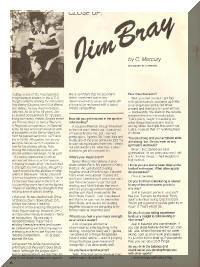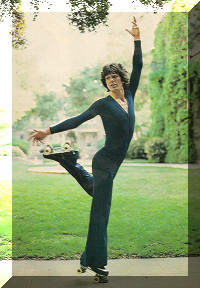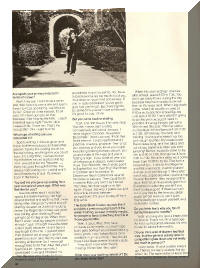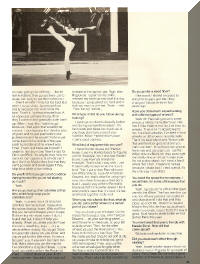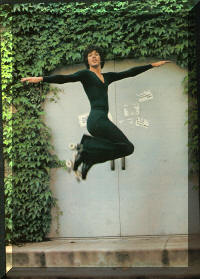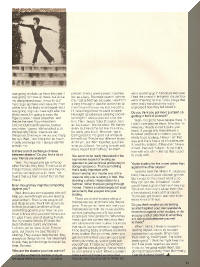Roller Skating Magazine (August, 1979)
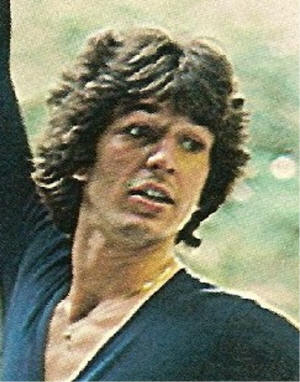 Jim
Bray is one of the most talented young freestyle skaters in the USA. Though
currently skating for instructors Chris Baerg (Downey) and Rick Weber (Simi
Valley), he has lived in Ontario, California, for all of his 18 years. Jim
has skated competitively for 12 years, having won every Artistic Singles
event from Primary Boys to Senior Men's in his Regional competitions. In
National meets, he has won in all divisions with the exception of Senior
Mens (in which he placed second in 1977 and third in 1978). Altogether, this
young freestylist has about 275 trophies to show for his skating efforts.
Now entering the International level, Jim feels the added challenge. As he
puts it, "it's nearly impossible to win an international title in your first
season. I'm hoping to make third." He feels his strength lies in freestyle,
though he is quick to point to the abilities of other skaters in that event.
"Ricky Ellsworth will be my toughest competition. I think he's the best
freestylist in the USA." Jim is working extra hard on his figures in hopes
of building his strength in that exacting area of artistic skating.
Jim
Bray is one of the most talented young freestyle skaters in the USA. Though
currently skating for instructors Chris Baerg (Downey) and Rick Weber (Simi
Valley), he has lived in Ontario, California, for all of his 18 years. Jim
has skated competitively for 12 years, having won every Artistic Singles
event from Primary Boys to Senior Men's in his Regional competitions. In
National meets, he has won in all divisions with the exception of Senior
Mens (in which he placed second in 1977 and third in 1978). Altogether, this
young freestylist has about 275 trophies to show for his skating efforts.
Now entering the International level, Jim feels the added challenge. As he
puts it, "it's nearly impossible to win an international title in your first
season. I'm hoping to make third." He feels his strength lies in freestyle,
though he is quick to point to the abilities of other skaters in that event.
"Ricky Ellsworth will be my toughest competition. I think he's the best
freestylist in the USA." Jim is working extra hard on his figures in hopes
of building his strength in that exacting area of artistic skating.
To that end, he has studied with Omar and Delores
Dunn (Bakersfield, CA), perhaps the Nation's leading instructors of the
exacting discipline of artistic Figure skating. However, Jim--like many
other freestyle skaters--feels that compulsory figures play a
disproportionately major role in deciding Freestyle competition. or, at
least, separate the two.
Having seen his brilliant and original performance at this year's God Skate
Classic (although the judge's didn't seem to appreciate it), we feel that
Jim Bray is one skater to keep your eye on. We're confident that his
abundant talent combined with a very determined will to excel, will make Jim
a force to be reckoned with in future Artistic competition.
How did you get involved in the
sport of roller skating?
A couple of friends brought me down to the rink and I
tried it out. It was kind of hard at first for me; but I learned pretty
quick, I guess. So I kept it up and finally one of the pros at the rink told
me to start taking lessons from him. I tried it out and like it a lot. After
that is when I started to get into competition.
What's your major event?
Senior Men's International; I also skate Artistic
Pairs. My Partner is Cathy Hallock. We just started skating together about 2
months ago. I skated Pairs when I was about 10 years old and I won
Elementary 5 years in a row. I quit Pairs because my partner quit skating;
and I didn't skate that event until two years ago when I started with
another girl. We'd skate just for the Gold Skate Classic. I just row skated
with Cathy for two months before the Gold Skate, and we are still skating
together because we are going to try for the National meet this year.
What do you feel is you major strength as an
artistic skater?
A lot of people tell me that showmanship is the big
thing in my skating. I can jump really well. I guess I've done a lot of
things that people haven't done before--a lot of jumping things that have
been given me a lot of recognition. I've done pretty well.
Do you have a favorite jump?
Yeah. The one that no one ever tried before was a
double Uler.
How does that work?
Well, you start on your right foot rolling backwards;
as you jump up in the air and spin two and a half times around and then land
on your left foot---backwards. You start on the outside edge and end on the
inside edge. That's pretty rough! I'm working on other things that everyone
else is asking about like triples flips and triple Lutz's. I can do that.
I'm working hard on those.
You are strong and your acrobatic skills are
strong, too. Do you ever do any gymnastic workouts?
When I first started out I did gymnastics. I'd run
every day and I did a lot of other things. I lifted weights in high school.
I know that you are also a water skier and a
football enthusiast. What other sports do you pursue?
I'm a snow skier.
Do you find that roller-skating is related to any
of the other sports you do in anyway?
Just in trying to perfect it and stuff like that.
Trying to be the best. Every sport's like that. Trying got be the best.
You've got a goal and you've gotta try to reach it. That's what I do.
Do you find your skiing experience lends any
insight to roller-skating or vice versa?
Just in balance and coordination. If you can skate
halfway decent, you can ski. Like, when I first started out water skiing, I
got up on one ski pretty easily. It's just like that in skating; if you can
do that, you can do a lot of things.
So you think the balance and coordination you
develop helps you with other sports?
I think it helps with everything.
Are sports your primary interest in terms of
career?
Yeah, they are. I want to be a writer and then I want to own a rink and
teach. I want to keep up skating, but it has to be fun. Once you lose
interest, it's all over. I'm never going to do that because I like helping
the kids. I coach baseball teams right now for Little League kids. I have
fun. That's my occupation. But I want to write.
What type of writing are you interested in?
Sports writing. I'd like to go on and travel to different places and see
other people. Sports like skating would be the main thing; anything else you
could learn. It's a big thing. I've had that on my mind ever since I started
skating. First I wanted to be the President---every kid goes through that!
But I've always had skating on my mind and it never leaves my blood. It's
always been in the family.
You told me you gave up skating for a year a couple
of years ago. What was that like for you?
I was into other stuff. I did other sports like basketball in junior
high--played football and stuff like that. I was doing other things so my
mind was off skating. As soon as June came along (when the Regionals come),
everyone was calling up and asking if I was going to do it (quit) because I
didn't have a way to get to the rink. I couldn't drive then (I wasn't old
enough), and my parents couldn't take me; my dad was working all the time.
So, I never got enough time to do that. After that year I learned a lot. I
grew up more, developed more and it helped me. The the next year, it was so
much easier to skate! I think it's good sometimes to quit for a while. You
have to because it takes too much out of you, it's a strain on your mind
sometimes. If you're really dedicated, you've got to give it all you got.
But there's got to be some time you can have a little rest; it's good for
you I think.
But you came back to skating.
Yeah, I couldn't leave it for very long! You see, I never start skating
competitively until about January. I never skate in October, November,
December. There's no way, If I do that, I lose interest. I skate real hard
and I practice, practice, practice. The once you practice and you know
you've got everything looking halfway decent, you go and skate at the meet
and you're feeling alright. If you skate all year you will always go in
stages, every skater does. Even the kids; they'll skate good in September
and then they'll come back up and fall down in January. The Gold Skate comes
in February and they'll be up. Then they all down again and rise again. It's
just that way; I guess you just lose a little interest between competitions.
It's good to stay off for a little while.
The Gold Skate Classic sounds like it provides a
pretty important part of the winter training, at least mentally maybe, for
people to have something that fills in those gap months.
Yeah it does. Plus, they have contests every month, too; that helps but it
gets boring if you've been skating many years. I don't skate those local
contests much anymore. They should have Gold Skate events for every
state--they don't know what they're missing! It's too bad they don't!
What does your training consist of? Do you skate
every day?
When I do start skating, I practice after school, about 3:00 to 7:30. You
don't get many hours during the day because they have sessions and all that,
so its kinda hard. When Regionals come, what I do usually is come at 6:00AM
to practice school figures until about 10:00. That's what I'm going to do
this year because I need to practice. It's a big thing to get to the World
meet this year. Then I practice my freestyle in the afternoon from 3:00 to
7:30, all freestyle. It's really hard training. You've got to keep it up,
too, go through routines. My routines are five minutes long, and that takes
a lot out of you, especially when you start jumping! Before I used to come
to the rink at 9:00 till 1:00, then go back from 4:00 to 7:30. Once in a
while we'd come back from 10:00 to 12:00. That took a lot out of you. That's
for the Regional and National meets, to work yourself and get your stamina
up. It takes a lot out of you, especially when you're all up there at the
meet. They have practice days like that, and you really get into it.
Everybody's watching you and you have to skate good. It takes so much out of
you that by the time you skate you're almost ready to call it quits. You've
really got to push yourself, and it's hard to do that.
Do you think that's why you fall off during the
autumn months?
Yeah, you've got to take a break after it's all over. That's me, I'm a
tightrope. As soon as Nationals are over, it's time to rest for about five
months.
Do you think a lot of skaters feel that way, that
the general activity level in competition goes down and not really too much
is going on?
I don't know. A lot of skaters keep it up. There's not many skaters that do
what I do. The main skaters I know think it's a must to start early. It it
was more of an easy going kind of thing---like for some skaters, they go out
there just to skate, not really to put themselves out--then it wouldn't
really be too bad. But when I do go skate, I put myself out. A lot of people
just take it easy, then they'll come in and gradually work back up. When I
was little I had it rough because I had a pro that wouldn't let me rest. I
took lessons from him or a lot of years and he just pushed me and pushed me
and he wouldn't let me just come back in the middle of the year (until I got
older and he knew it was time). Then I quit because I couldn't skate for him
anymore. Now I skate for Chris and Rick. It's alright, they help me out a
lot, but I guess a lot of kids can't do it like that. Maybe they feel that
they can't go back and skate again if they stop for a while or something.
Do you find that you get
out of condition during the months you're not skating so much?
Yeah.
Are you pursuing other activities at that time
which help keep you in condition, too?
Yeah, I run and I do a lot of school activities like basketball. I played on
the school football team. With stuff like that you run and it keeps you in
shape. But running alone just doesn't do it. I found that out, it doesn't
help you directly. When you skate you don't use the same breathing, legs...
it's a whole different story. You've got those ten pounder skates on, you
know, and you've got to lift a little more. It takes a lot out of you. I you
work too hard, too fast, that's when you get he injuries. I've done that a
couple of times. I came back two weeks before the Regional meet. I didn't
skate all year and I really pushed. I decided that I wanted to skate at the
last minute. Right after Regionals I sprained my ankle, messed my back up
and stuff like that because I pushed too hard and it took too much out of
me.
What type of diet do you follow during training?
I pack up on vitamins heavily before and during competition season. It's
hard work and takes too much out of you if you don't take care of your
nutrition. Most important is my own mom's good cooking!
What kind of equipment do you use?
I have Snyder skates with Harlick boots. I use my Harlick boots for figures
and freestyle too. I also use Riedell boots. I use Rannalli wheels for
freestyle. That's what I stay with. I use those mostly except when the
floor's bad. Then I put on two Rannalli and two White Velvets. I use All
American Dreams, too, that's what I'm using right now, two of each because
the floor's bad. I usually stay with the Rannallis because that's the better
wheel. I think everybody's used that. It's nice, it's fast and holds
together really well.
When you mix wheels like that, what do you do, put
a softer wheel on a certain part of your skate?
Say you have your left skate. On the inside front you put, say, All American
Dreams--on your spinning wheel--and the same on the back, on your left
outside wheel. Then, for the other wheels you put the Rannallis on. You have
to do this on a bad floor. The Rannallis are fast (they're not soft at all),
so you put those on to help you get a little more speed. Then, you use the
other two wheels just for grip when the floor's really bad and slick. It's
been harder since they put plastic on the floor. That's why I do that
sometimes.
Do you prefer a wood floor?
I like wood. I skated on wood for about nine years and then they changed it
about three or four years ago.
Have you done much experimenting with different
types of wheels?
Yeah. Mr. Rannalli gives me some wheels and lets me try them out. I tell him
is I like them or not. So I've tried his wheels. The All American Dreams
too. I've tried Labedas. I've tried a lot of wheels and the best one is
Rannalli. That's my best wheel and I'll stick with that until the floor gets
bad and you can't use them. I tried them last year at Nationals and got
stuck so I put the White Velvet wheels on they were tight. I'm not a slow
skater so I need a hard wheel that's fast. It needs to be fast because I
skated fast. I need speed, it's the only way I can skate.
You need the speed for momentum, I would think, for
some of the jumps that you do.
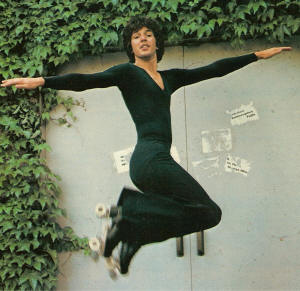
Yeah. I guess some of the other guys went to the White. The floor was like
ice you could have put your ice skates on and skated on it! I did that and
they stood up and I fell. That's the breaks! Maybe they'll fix the floor up,
but that's really no excuse; cause that's the way it goes. I just have to
skate better when I get up there this year!
You mentioned that you're friends with Natalie
Dunn. How did that come about?
We've been friends for a long time.
Did you meet each other through skating?
Yeah. I used to take lessons from her dad and mom in Figures for a
couple of years. He's [Omar Dunn] really a good teacher; and they're all
good skaters. I was going to skate up there this year. I was going to move
up there; but since my dad passed away, it was kind of hard to go up there
and leave my mom at this time. So that's what happened, I was going to go up
there right after the World meet. I'm going to need the Figures soon. I need
a teacher and they're the best Figures teachers around. Butch and I are like
brother and sister, I guess. We've talked a lot. We're pretty close, 'cause
we talk things out. She helps me out with and I help her out. Well I don't
help her so much, mostly she helps me! I always ask her to help me!
Is there a lot of exchange of ideas between
skaters? Do you find a lot of your friends are skaters?
Yeah. You've gotta relate with your other friends, they help. There's a lot
of things that you don't know and they do, so they can help you a lot there.
I've found that out from a lot of friends that I have.
Even though they might be competing against you?
Well, there are some people who will help you, even though you are skating
against them. Then some people will just despise you, they'll talk about
behind you back and then will say something good to your face. So you have
to know who your real friends are. I'm glad I have a lot of skating friends,
like my closest friends. Friends like Butch [Natalie Dunn] and Donna
LaBriola, we've been close. They're girls, but they're my best friends in
skating. They always help me out, they always do things for me. I've never
had to ask, they just do things for me all the time. It's neat.
Who are the skaters you most admire?
For the women its Natalie. Not just because she's a champion, but as a
person she's a great person. I admire her as a lady. The male skater I
admire the most is Michael Jacques. He's from a long time ago; I used to
watch him all the time and he was my idol. He still is. I'll never forget
how he used to skate. He might be sideways jumping and still land right. I
always wanted to be like him. There there's Toller Cranston, he's an ice
skater. I like his show. He makes every routine. He goes out and puts
himself out. They're two different styles and if you put them together, just
think what you'd have. I'm trying to work and make myself look halfway like
them
You seem to be really interested in the expressive
aspect of skating as opposed to just technical proficiency in doing
maneuvers. That's something that's really important with showmanship and
maybe one of the reasons why you're strong in that. You do bring a whole
interpretation to a number, rather than just going through moves. There's a
certain aspect of your personality that you put into your skating.
There are a lot of skaters who put themselves out, and that's why they're
good. They go out there and really put themselves out with the music and the
content (jumping and all), but some people just have problems. When they
mess up in the content they blow their attitude towards their routine. I
don't do that much, but sometimes it happens. I'll be skating badly and have
problems in my routine. But you know, when you get out on that floor you
can't quit. Even when you mess up, you've got to put yourself out. It helps
out sometimes if you get the crowd going. I've worked a lot on that kind of
stuff. With my content there's a lot of things I've done that nobody else
has ever done. When we were warming up in Nationals last year, I had the
crowd. It felt good cause they were cheering for me, I'd do things that
we're really hard and they really expressed how they felt about it.
Do you think you get more pumped up getting in
front of a crowd?
Yeah. I've got to have people there. If I don't have anyone there, I feel
like I'm sleeping. If you go and maybe have a hundred people at a contest
you're ready to go to sleep. I know I am that way and it's how a lot of
skaters are. A lot of the skaters, if they don't have a crowd, they won't
skate. I know that's true with a lot of my friends that I used to skate
with.
You're skating for the crowd rather than against
the other skater?
I want to beat the others. If I skate my best, I have a chance of beating
them. But I skate for the crowd mostly, so they can see me. It means if I
skate good I have a good chance of beating'em and I don't worry about them
(the other skaters), that's all that counts. You've just got to work real
hard to do those kinds of things.
Do you think maybe you're testing yourself against
your own standards more than against other skaters, or do you pay a lot of
attention to what they are doing and compare yourself to them?
When I skate, I skate for myself--beating myself. I don't try to skate
against them, so much. When I see them skating, I tell myself, "He looks
pretty good." I think he might beat me and if we skate together, we don't
know, so I've gotta watch them, too. I don't let that out of my mind. But
mostly I just think about myself.
